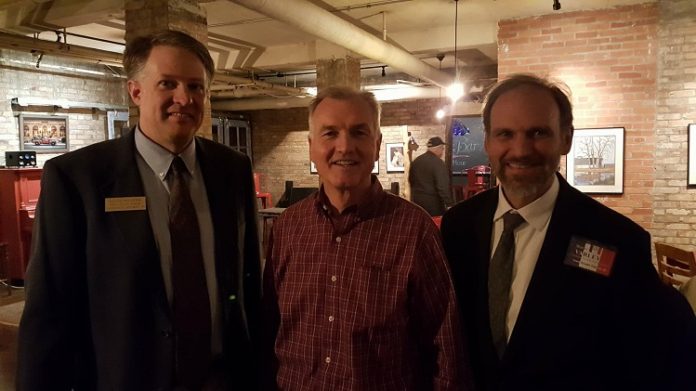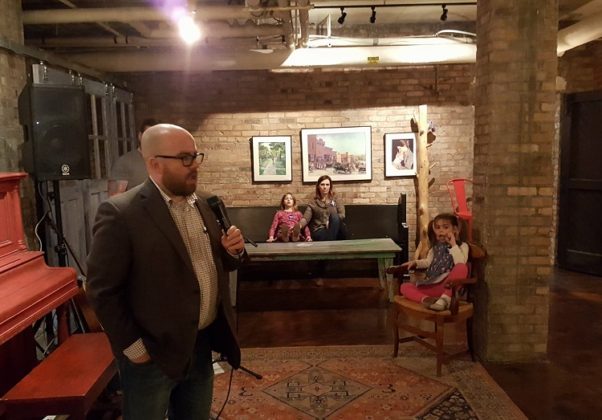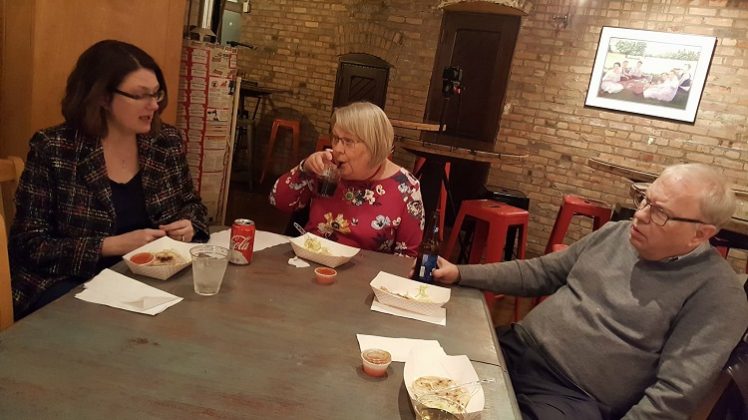
About 75 Perry-area Democrats braved Friday night’s sleet and gathered in the Cellar of La Poste to meet and share ideas with three men standing for state elected offices, gubernatorial candidate John Norris of Des Moines and Iowa House candidates David Weaver of Rippey and Warren Varley of Stuart.
Since Friday was also the deadline for Iowa’s federal- and state-level office seekers to file nomination papers with the Iowa Secretary of State, the visiting candidates’ races were better defined when they rose in turn to speak to the Perry audience. A common theme among the speakers was the destructive laws emerging from last year’s Republican-controlled session of the Iowa Legislature and the likelihood of more damage coming from the current session.
Norris occupies the field with five other Democratic candidates in the June primary election, whose winner will face Gov. Kim Reynolds or another Republican for the privilege of occupying Terrace Hill for four years. Seeking the nomination along with Norris are Nate Bolton of Des Moines, Cathy Glasson of Coralville, Fred Hubbell of Des Moines, Andy McGuire of Des Moines and Ross Wilburn of Ames. A seventh runner, Jon Neiderbach of Des Moines, withdrew his nomination Tuesday and threw his support behind Norris.
“While we hear a lot of talk today about a rural-urban divide, that’s not the divide I mean,” Norris said in his opening remarks. “It’s the increasing divide between the haves and the have nots in our society, and that transcends rural and urban. That’s what we have to address in Iowa today, the increasing economic disparity between too many Iowans.”
He said he learned lessons about that wealth disparity as a child when he helped his father organize for the Iowa Farm Unity Coalition, and again during the farm crisis of the 1980s and as the state manager of the Rev. Jesse Jackson’s 1988 presidential campaign, and again as the chief of staff first for Iowa Gov. Tom Vilsack and later for U.S. Secretary of Agriculture Vilsack. Norris said he learned the lesson forcefully during his stint as a UN representative for agricultural policy.
 “I ran into it many times,” he said, “how long we’ve been dumping our cheap commodities on their markets and undermining their own farmers’ capacity to raise food to feed their own nation and make a living.” He said U.S. agricultural policy “has really never been about helping the family farmer. It’s always been about big agribusiness and grain shippers profiting off our people here and off taxpayers.”
“I ran into it many times,” he said, “how long we’ve been dumping our cheap commodities on their markets and undermining their own farmers’ capacity to raise food to feed their own nation and make a living.” He said U.S. agricultural policy “has really never been about helping the family farmer. It’s always been about big agribusiness and grain shippers profiting off our people here and off taxpayers.”
Norris said the current crop of Republican state lawmakers is squandering Iowa’s future, and his own policies center on renewed commitments to education, health care, mental health care and the environment.
“Our chief economic development strategy in Iowa today,” he said, “as announced by the governor and department director, is to lure out-of-state businesses here with tax credits. So we are undermining our financial and fiscal capacity to invest in education and mental health services and our future. That is not a sustainable economic development strategy, folks. We have to change it. It’s going to take leadership in that governor’s office and the legislature to make those kind of changes.”
After delivering a series of detailed policy statements — from agriculture and the environment to education and mental health — Norris gave a clear-eyed analysis of what is at stake for Iowans in the 2018 and 2020 election cycles.
“This election is ultimately about contesting for power,” he said, “contesting for power against the wealthy special interests and corporate lobbyists that run our government today.”
For all his policy wonkery and political pragmatism, Norris said his principles still lead his campaign.
“When I went to work for Rev. Jackson in 1987, a former state chair of the Democratic party told me that I would be finished in Democratic politics,” he said. “Ten years later, I was the state chair of the Iowa Democratic party. The lesson I learned from that is if you follow your ideals and values, the politics will work itself out.”
Norris said he has “a message that resonates in rural Iowa. I know it. I’m from it. I’ve lived it. I’ve been out their campaigning for eight months a lot in rural Iowa.” He said rural campaigning might seem “a little bit counterintuitive for a Democratic primary,” but he said he makes the same points in his speeches to residents of Iowa’s cities as he does to rural voters.
“If it erodes all around our urban centers, then we can’t afford to maintain the human and fiscal infrastructure for rural Iowa,” he said. “It is to our state’s benefit that we help restore economic opportunity in rural Iowa and quality of life. It doesn’t hurt that half of them (people in Iowa’s cities) still have parents or grandparents who still live in rural Iowa. We emotionally care about rural Iowa, and I still believe we have that fundamental love for the land, that sense of community and that fundamental belief that public education is the great equal opportunity for everyone in our state. We should get back to rural Iowa, reconnect with Iowans about our values so that they can get behind a policy agenda that builds hope in rural Iowa.”
It will take more than a governor to bring about the changes he described, he said. It will also take likeminded lawmakers in the legislature, and the two candidates for the Iowa House of Representatives visiting Perry with Norris appeared to share his concerns and many of his prescriptions for curing the ills of the number-one state in the U.S.
David Weaver of Rippey is running unopposed for the Democratic nomination in House District 47, where the incumbent Republican, Rep. Chip Baltimore of Boone, has chosen not to seek reelection. Along with Weaver, candidates who filed by the 5 p.m. deadline Friday include Republicans Donald J. Batt of Boone, Victoria Sinclair of Boone and Phil Thompson of Jefferson. Libertarian Party candidate Patrick A. Shaw of Boone has also filed.
Weaver earned a master’s degree in library science at the University of Iowa and worked as a research librarian at Grinnell College and Augustana College in Rock Island, Ill., before returning to central Iowa to work the family farm in Greene and Boone counties.
Weaver started his speech by noting that a farmer is dependent on two things, the weather and the commodity markets, “and I can’t control a darn thing about either one of them,” he said. “There’s a lot of things that we can’t control in life. I can’t control who my political opponent is, but I can control how I behave. I can control how I act. I can control how I treat others, and I can control what kind of legislator I’m going to be and the legislation I’m going to work for.”
As an indication of the kind of legislator he intends to be, Weaver said he always keeps two pictures in the breast pocket of his jacket. One is a picture of his grandfather, Lee Dorris, a longtime Greene County Supervisor and a lifelong farmer who taught his grandson fundamental moral lessons. The second picture is of Natalie Finn, the West Des Moines 16-year-old who died of starvation in October 2016 at the hands of her adoptive parents. Like the similarly tragic story of Sabrina Ray of Perry, Finn’s horrific death galvanized public opinion around the need for serious change in the Iowa Department of Human Services (DHS).
Just as a farmer cannot control the weather or commodity prices, Weaver said, so we “cannot control Natalie Finn’s adoptive parents. We have no control over them, but we can control what we do with DHS. We can control how much money we spend, and we can control how many people we have employed by DHS.”
Weaver matched his call for a renewed commitment from the state to the DHS with a call for a similar commitment to the environment and the Iowa Department of Natural Resources (DNR). He noted that when 63 percent of Iowans voted in 2010 to amend the state’s constitution in order to create the Natural Resources and Outdoor Recreation Trust Fund, the annual budget of the DNR was $22 million. Last year’s DNR budget was $11 million.
“We’re going the wrong way,” he said. “We need to pick it up, and we need to turn it around, and that’s what I’m going to do when I go down to the statehouse.”
Weaver said he thought about a run for the statehouse for a long time, but the series of bills signed into law during last year’s session turned his thoughts into action.
“What were they doing? What were they thinking?” he said he asked himself. “First thing they did, they went after collective bargaining. That is one thing that Robert Ray put in in 1974. It just really, really, really upset me. I told my wife then, I said, ‘I’m going to do this. I’m going to run for the state legislature.’ As I watched that legislative session, they went after collective bargaining, and they went after the Des Moines Water Works, and they went after Planned Parenthood, and they went after the Leopold Center. These are just not things that Iowans are about. The current representative, Chip Baltimore, he’s one of the people on the judiciary committee. He took money from the NRA. They got the stand-your-ground law passed last session. Iowa was one of the last states to get that. There’s about 35 states that have stand-your-ground laws, and that happened to Iowa last year. So I’m running for the right reasons, and I’m really excited to do it.”
In House District 20, three candidates are seeking the seat of nine-term Republican Rep. Clel Baudler, who is retiring. Democrat Warren Varley of Stuart is running unopposed in the primary election, while Republicans Dodge Michael Perrigo of Redfield and Ray Bubba Sorensen of Greenfield complete the field. No Libertarian candidate filed nomination papers.
Varley is a lawyer and farmer, and he spoke to both these areas of expertise and to the legislation he would pursue related to them. Like his fellow Democrats, Varley shared with the Perry people his indignation over recent Republican legislative actions.
Varley and Weaver are among 113 Democrats running for 95 seats in the Iowa House, the largest number of seats contested by either party for more than 30 years. By contrast, the House Republicans have marshaled candidates for 75 contested seats, and 12 members — 20 percent of the Republican caucus — are retiring, costing the party 117 years of incumbency.
Friday’s political evening was hosted by Mark and Kris Powell, Barry and Pat Bengston, Liz Garst, Steve and Mary Kautzky, John and Kathy Powell, Jim Riordan and Gary and Mary Weaver.


















